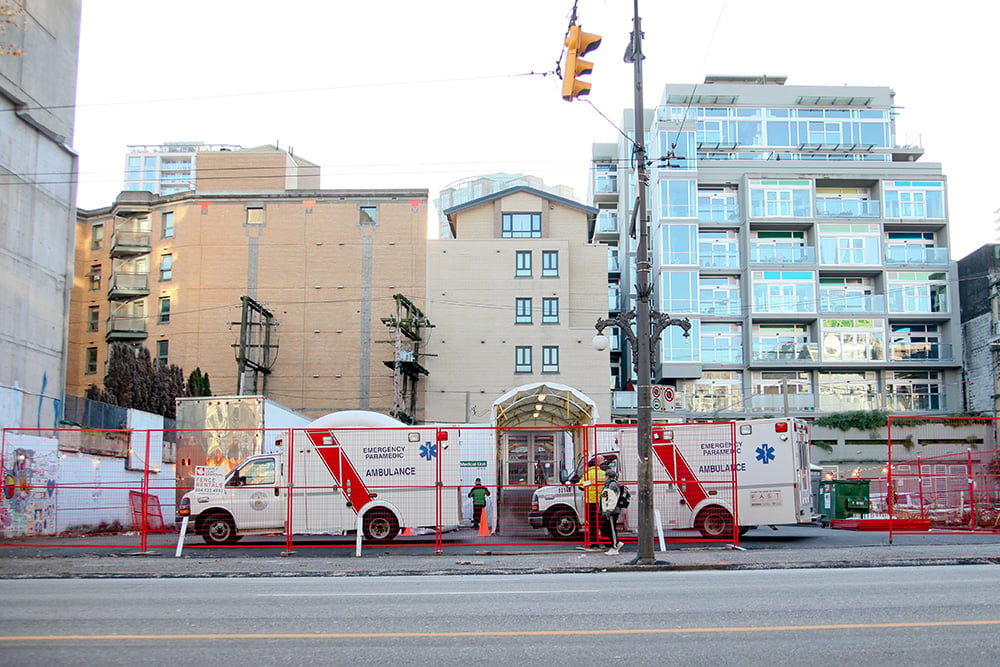Overdose deaths claimed another 170 people in B.C. in May, and politicians and policy makers are understandably desperate to find solutions as the crisis continues.
But the B.C. government’s new plan to allow people under 19 who overdose to be detained against their will in hospital for up to seven days is a mistake.
Mental Health and Addictions Minister Judy Darcy announced the proposed changes to the Mental Health Act to allow what she described as “short-term stabilization care for a youth in the immediate aftermath of an overdose.”
The changes would allow involuntary detainment in hospital to allow creation of a voluntary recovery plan.
But the proposed legislative change is a gross distortion of the purpose of the BC Mental Health Act, which allows detention of people experiencing severe mental health issues who are at risk of harming themselves or others and unwilling to voluntarily admit themselves to hospital for treatment. The proposed change glosses over the potential harms of detaining a youth while health-care professionals create the recovery plan.
Many youth-focused mental health and substance use clinicians are wondering exactly how the proposed comprehensive care plans can happen given the current lack of available services and resources, and how it would affect the engagement of a disenfranchised and stigmatized group.
Shockingly, the voice of youths who use substances is missing from this public conversation.
In all age groups, the number of people involuntarily admitted to hospital by way of the Mental Health Act has been steadily increasing.
A 2019 ombudsperson's report found a large percentage of people involuntarily admitted to hospital are not informed of their rights under the Mental Health Act, nor have they consented to treatment. Involuntary admission can be experienced as punitive, traumatic, paternalistic and a violation of rights and autonomy. This can cause lasting harm and drive people away from a system meant to help.
With the proposed change in legislation, those under 19 arriving in hospital following opiate poisoning will meet the criteria for involuntary admission.
What is the potential long-term damage if young people are detained involuntarily? Will the loss of trust and safety in the system deter youth from voluntarily seeking help in the future?
Are certain populations, like Indigenous youth, going to be over-represented in this forced treatment? We know that Indigenous people are disproportionately affected by opioid overdoses and overdose deaths, especially in the recent context of COVID-19 measures. We also know that Indigenous people are more likely to experience unsafe, racist and dehumanizing care when they do interact with the health-care system. What risks are being taken by increasing the likelihood Indigenous youth will be coerced into care?
The crucial therapeutic relationship between health-care providers and patients requires a collaborative and trauma-informed approach to engage youth. Coercive care can negatively impact future health-care relationships.
Developing treatment plans may be the goal. However, the outcome of a short-term forced hospitalization is more akin to substance detox, especially for youth outside of an urban centre where there might not even be a substance use physician or specialized services.
Research has highlighted the higher risk of fatal overdose in the first days after detention or treatment because abstinence for a period of time decreases opiate tolerance.
And if young people do overdose, will they or their peers be less likely to seek medical care because of previous negative or traumatic experiences and fear of being locked up in hospital?
Parents and families are scared and desperate for help. They have been vocal about the lack of available and accessible services for youth living with substance use issues. Detaining youths will serve no purpose without those services.
And parents and guardians left out of the decision-making process are already at a loss in knowing how to help their child when they come into contact with the system as result of their substance use. Adding involuntary detention is not a way to mend relationships.
B.C. may be following similar legislation in place in Alberta. Since 2006, the Alberta Protection of Children Abusing Drugs Act has allowed a “protection order.” The Alberta Health Services’ website advises parents “your child will be taken involuntarily to a Protective Safe House for up to 15 days for detoxification, stabilization and assessment.”
If B.C. is proposing a similar model, we need to know the evidence on the impact of the Alberta legislation collected over the last 14 years. Has it shown long-term benefit, or is it causing more distress, lasting trauma and mistrust of the health-care system among youth? Have opiate overdose deaths of those under 18 decreased?
We must also question why this legislation is proposed as part of the Mental Health Act, when substance use is not a mental illness.
The Mental Health and Addictions Ministry needs to provide transparent analysis about the risk and benefits of this proposed change and consult with those who will be most impacted — including youth.
Health-care clinicians who work with youth who use substances need the opportunity to question and call for research on this strategy. We need specific criteria and plans to measure health outcomes.
We need to know, in fact, if this is an evidence-informed approach to help youth with substance use issues, or a misguided quick fix that may do more harm than good. ![]()
Read more: Health, Rights + Justice















Tyee Commenting Guidelines
Comments that violate guidelines risk being deleted, and violations may result in a temporary or permanent user ban. Maintain the spirit of good conversation to stay in the discussion.
*Please note The Tyee is not a forum for spreading misinformation about COVID-19, denying its existence or minimizing its risk to public health.
Do:
Do not: